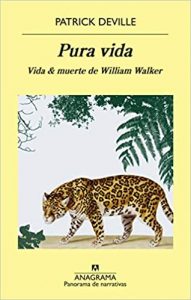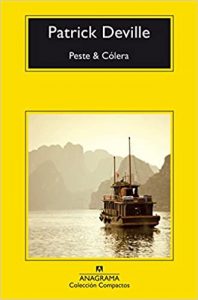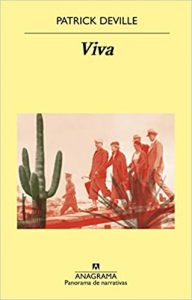To be a novelist patrick deville It seems more like a kind of biograph of disruptively relevant characters who passed through places as disparate as Central Africa, Southeast Asia or Central America. Guys in search of adventure and glories (glories already lost in colonies no less overexploited), in a nineteenth-century period so idealized and strange as to connect a novelistic line that Deville exploits very pleasantly.
Because the final impression is that of an absurd world but very true in essence. A world in which reality and fiction are confused, where the most grotesque characters are real and the scenery is as true as it is disconcerting.
And precisely in that impossible mix between reality and fiction lies the charm of this French writer who became a chronicler of fascinating places, exotic for almost everyone except those who live there. Special attention is paid to the aforementioned Central America in his work, that thread that weaves together countries in transition between the United States and South America.
Blessed by himself Sergio Ramirez Due to his fascination with his country of origin, Nicaragua, as well as the link between this and all other surrounding countries such as Costa Rica, Mexico or Guatemala, Deville is a different, magnetic historical novelist.
Top 3 Recommended Novels by Patrick Deville
Pure Life. Life and death of William Walker
In the end, History offers a different vision, a kind of true human brilliance thanks to grotesque and extravagant characters like William walker. Madmen convinced by improvised ideals for adventure and who end up unveiling the great miseries and underground plans that other so-called great men meditate for their own glory and power.
His status as one of the last filibusters makes William Walker an outdated character for his time, in the XNUMXth century. And yet, with the passage of time, his figure has acquired the profile of a kind of Caribbean Robin Hood who planned invasions, confronted established states and overseas trade.
Only that the end of this type of madman usually ends up succumbing to the danger through which they move without due awareness of the risk. At the age of thirty-six, William Walker ended up being shot in Honduras.
Walker acted convinced by the doctrine of Manifest Destiny, a kind of almost divine political justification that gave the United States a right to expand throughout America.
In his various campaigns throughout almost all of Latin America, he managed to mobilize soldiers for his cause in Mexico, Costa Rica, Honduras and Nicaragua.
As usually happens in any ideology based on a consideration of reason as the ultimate truth, Walker granted himself the right to raid ships or establish fictitious republics. His treatment of the townspeople, always benevolent, his respect for defeated enemy soldiers and his ability to enrage big businessmen who did business from the United States with all of Central America gave him popular fame that on many occasions opted for the popular.
So in light of the character, constructing this novel would not be that difficult at the plot level. The life of William Walker is in itself a novel that delves into the History of America with the firmness of his determined step, with the imprint of his utopian ideology and sometimes, with his Machiavellian procedure.
One of the great characters in the extensive history of the American revolutions, along with Ché Guevara or Simón Bolivar himself.
Plague & cholera
Around the great circumstances and the great discoveries there are always events that come as anecdotes to our days but that, in fairness, become transcendental as soon as they scratch the course of the events. A prosecutor and literary judge, Deville presents us with a new vision of one of the greatest medical advances.
In 1887, while France was preparing the celebrations for the centenary of the French Revolution, Louis Pasteur founded a school of biology and discovered the vaccine against rabies. At the age of twenty-two, the Swiss Alexandre Yersin arrived in Paris and enrolled in the Pasteurian adventure. He investigates tuberculosis and diphtheria, and everything leads him to become one of Pasteur's privileged successors.
But Yersin is moved by an adventurous spirit, like that of his admired Livingstone, a hero of his childhood and adolescence. Then, the young man enrolls as a doctor on a ship, sets sail and begins his voyages through the Far East, explores the jungle, and travels to China, Aden and Madagascar. And during the great Hong Kong epidemic in 1894, he discovered the plague bacillus.
Narration of a passionate scientific and human adventure. And, at the same time, the story of the first decades of a convulsive 1940th century, which takes place to the rhythm of the plane from which Yersin, during his last trip from France to Saigon, in XNUMX, recalls a life dedicated to the development of human knowledge. .
Viva
History is sometimes a meeting of personalities yet to find their place as such. Because history is also life and in its interludes the characters do not play their historical role, but live, or survive, as it is their turn...
Mexico, 1937. León Trotsky and his wife, Natalia Ivanovna, disembark from the Norwegian tanker Ruth in the port of Tampico. They flee from Stalin, and the painter Frida Kahlo will welcome them into her home. In those years, in Cuernavaca, the British writer Malcolm Lowry invokes his demons, drinks and writes Under the Volcano.
The Mexico of the 1930s is a political and cultural hotbed, where expatriates and natives who are going to forge political and aesthetic revolutions that will leave their mark on the XNUMXth century intersect or live without ever crossing paths.
And thus, between Trotsky and Lowry, axes of this concise Rio novel, the photographer Tina Modotti appears in the pages of the book; a Sandino who works at Huasteca Petroleum and will later become a guerrilla leader in his native Nicaragua; the enigmatic Ret Marut, who has come from Europe, where he has been a political agitator, and will sign under the pseudonym of B. Traven El tesoro de Sierra Madre; Antonin Artaud in search of the Tarahumara, Diego Rivera, André Breton, Graham Greene, the boxer poet Arthur Cravan ...
Characters in search of a dream, an ideal. This seductive novel joins the cycle of narrative travels around the world and the story of Patrick Deville, which also includes Peste & Cholera and Ecuatoria. In these works the author traces a map of our contradictory world through characters touched by genius or madness.



